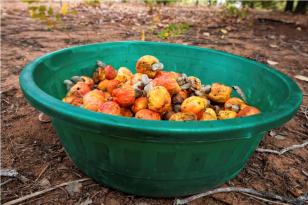- English
- Français
- Português
Update on West African Season: Production Falls Below Expectations After Late Start to Season
Nearing the mid-point of West Africa’s cashew season, much uncertainty remains internationally about this year’s RCN crop. A late start to arrivals from West African destinations has already had begun to push international RCN and kernel prices slightly upward. Here, we offer our perspective on trends that have characterized the season so far:
Production Volumes Below Previous Years
Almost all of Africa’s cashew producing countries have seen lower than normal production volumes this year. Cote d’Ivoire, by far Africa’s largest producer of RCN, is expected to record production up to 40% less than last year. This means Cote d’Ivoire could see a sharp dip in production figures from last year’s 400,000MT to a figure more in the range of 250,000MT. The situation is similar but not quite as severe in Ghana, where some farmers have reported collecting only half the volume as last year, although others report more normal levels. A third flowering did not materialize there as usual. In Nigeria, only 70,000MT have arrived in Lagos, in contrast to early projections of 100,000MT. Senegal and The Gambia also experienced a short crop. Cold weather never before experienced in early April and unusual rains severely limited the size of the crop, which has pushed prices high in these two countries. In the region, only Burkina Faso has seen a normal crop.
Late Start to the Season
 A combination of factors has led to every stage of the season being delayed by a few weeks in all locations. Unfavorable weather patterns led to a slow flowering throughout the region. Confusion over appropriate prices in several locations also delayed the start of trading even once nuts became available. In Cote d’Ivoire, an indicative price was set that was viewed by some to be higher than the market demanded. In Benin, foreign traders drove prices up early, stalling local traders’ activity, while in Burkina Faso, some farmers held nuts in the hope that prices would increase later in the season. Finally, logistical problems at several ports have delayed exports, including a shortage of packing materials and severe congestion at the Abidjan port with a lack of both containers and storage space.
A combination of factors has led to every stage of the season being delayed by a few weeks in all locations. Unfavorable weather patterns led to a slow flowering throughout the region. Confusion over appropriate prices in several locations also delayed the start of trading even once nuts became available. In Cote d’Ivoire, an indicative price was set that was viewed by some to be higher than the market demanded. In Benin, foreign traders drove prices up early, stalling local traders’ activity, while in Burkina Faso, some farmers held nuts in the hope that prices would increase later in the season. Finally, logistical problems at several ports have delayed exports, including a shortage of packing materials and severe congestion at the Abidjan port with a lack of both containers and storage space.
Mixing of Quality in Benin, Nigeria, Togo
Nigeria experienced particularly low quality in its crop this year due to excess rains. Outturn averaged around 44 lbs, significantly below the average of between 48 and 50 lb. The low quality caused some exporters to leave the Nigerian market early, leaving primarily Beninese traders buying the Nigerian product to export through Benin. Beninese traders are also active in Togo, which is recording slightly lower prices than in Benin. This has led to the return of the recurring problem of mixture of outturns and quality in Beninese exports.
Cote d’Ivoire/Ghana Border Closed
The Ivorian government announced early in the season that the border with Ghana between Sampa and Bondoukou has been officially closed, as the government wanted to limit the flow of Ivorian nuts into Ghana for export. Although nuts from Cote d’Ivoire continued to come across the border through unofficial routes, Ivorian authorities have improved controls here as well. Ghana’s exports of RCN will thus be significantly lower this year. As more nuts now need to be exported out of Cote d’Ivoire, this has contributed to the shipping blockages in the Abidjan port. It has also affected prices in Burkina Faso, as there has been increased demand from Ghanaian traders.
Political Unrest in Guinea-Bissau Stops Exports
A coup in Guinea-Bissau in mid-April has crippled activity in the cashew sector. Banks were closed which made financing unavailable, and traders were afraid to buy nuts due to security concerns. Things have calmed down and trading commenced, but there remains an inability to export from Bissau. There is no active government authority to issue the required export authorization. Many have thus attempted to bring nuts by road across the border into Senegal, although the military administration is trying to control this. This situation is extremely important for the world market as Guinea-Bissau is Africa’s second largest producer of RCN.



